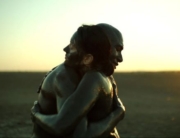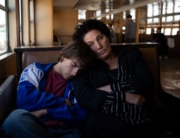It has been more than 10 years since the doors to Central Perk closed for good, and following the 2004 series finale of Friends, debate has ensued and endured regarding the legitimacy of Jennifer Aniston’s “movie star” moniker. Critics cite her affinity for taking on the beleaguered girlfriend role as well as her purported lack of range (“Rachel Green on the big screen”). Supporters reference her strong, unexpected performances in small, unconventional films such as The Good Girl and… well, mostly just The Good Girl.
Yet this year, somehow, Aniston took everyone by surprise—not an easy endeavor in a career that thrives on tabloid covers and speculative headlines—with the release of Cake. A film that is neither great nor ghastly, Cake is notable mostly because it features a performance that marks Aniston’s delayed arrival, not as a movie star but as a formidable actor with talents rivaling many of her contemporaries.
Aniston plays Claire Simmons, a divorced, unemployed lawyer who suffers from both chronic physical pain, the result of a grisly car accident, and, cutting ever so deeply, the abiding emotional ache of a lost loved one. The actor has faded scars across her face and neck, discolorations that are especially striking on a facade that is usually blemish-free, photoshopped to infinity.
Cake opens at a group therapy session for sufferers of chronic pain, and from the get-go, it’s evident that the one thing Claire does not suffer from is lack of a filter. She’s a crude, grouchy curmudgeon who lacks the tact to bite her tongue while her therapy cohorts mourn the death of one of their own: Nina (Anna Kendrick), a young mother who jumped to her death from a freeway overpass, leaving behind a husband and young son.
Upon her expulsion from the group, Claire returns home to the patient, open embrace of her housekeeper, Silvana (the excellent Babel Oscar nominee Adriana Barraza). Silvana is a caretaker who, for reasons unexplained, puts up with Claire’s endless, grousing nonsense. This baseless level of patience manifests as a recurring theme; most of the people in Claire’s life grant her much more leniency than she ever seems to deserve. It’s as if the characters see something in her that the viewers are not privy to, a device that would be intriguing if it wasn’t ultimately unsubstantiated.
While the interactions between Claire and Silvana are diverting, particularly during their trek to Tijuana to score illicit painkillers, the bulk of the film lacks an emphatic energy. And then there are parts that are just needlessly outlandish.
Nina returns as a caustic, pushy ghost, whom Claire wrangles with as she struggles to find a respite in her literally painful daily existence. It’s difficult to take Cake’s weighty matters seriously when they are juxtaposed with scenes of a phantom attempting to commit homicide in a backyard swimming pool, regardless of the metaphorical bearings.
Cake’s chief triumph is its depiction of Claire as an imperfect, palpable human. Claire is selfish, she is a complainer, she does not accommodate for others, and she is the kind of woman that we need to see more of on the big screen. Women are human, too (believe it or not), but unlike their male counterparts, they are rarely portrayed across the spectrum of the human condition. In her portrayal of Claire, Aniston understands that women can be strong and powerful, but they can also be weak and damaged. She presents Claire not as a redeemable miscreant but as an unapologetically flawed, angry, aching human who falls as often as she flies.
Despite its limitations, Cake abides as a sufficient platform for Aniston to display her full range of acting chops. With the physical scars and the dearth of Covergirl makeup shimmer, Aniston removes her mask of marketability. It’s a bold, flaws-and-all approach, and despite the absence of studio sheen, Aniston shines bright. As an actor, it appears that she may have taken a cue from her onscreen character by diving off the edge of her Friendly safety net. If this performance is any indication, Aniston has dumped out her final mug of Central Perk coffee in favor of the dense, tantalizing layers of a devil’s food Cake.

















Leave A Comment